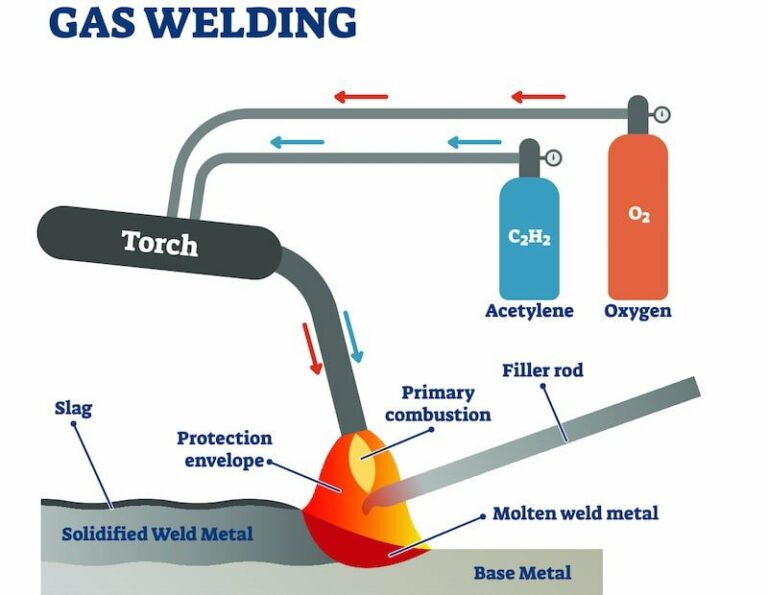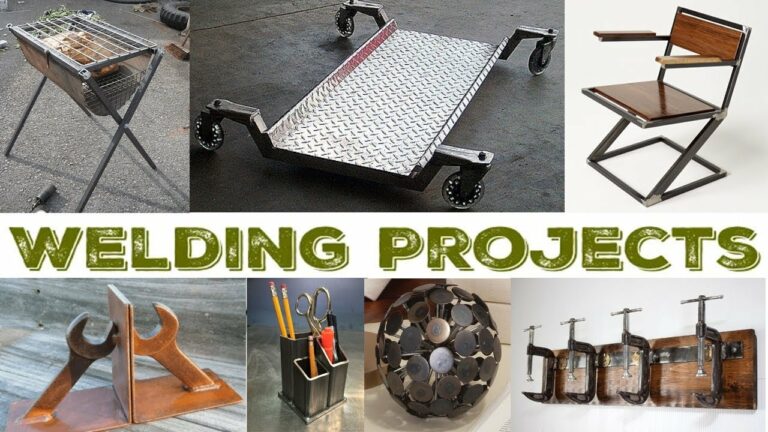The Ultimate Guide To Choosing The Best Homeowner Welder: A Complete Review
Looking to find the best homeowner welder? Well, you’ve come to the right place! Whether you’re a DIY enthusiast or someone who loves to tackle home improvement projects, having a reliable welder is essential. With so many options available in the market, finding the perfect welder can sometimes feel overwhelming. But fear not! In this article, we’ll guide you through the process and help you choose the best homeowner welder that suits your needs. So, let’s jump right in and explore the world of welding tools to find the perfect match for you.
Best Homeowner Welder: A Comprehensive Guide for DIY Enthusiasts
Whether you’re a DIY enthusiast, a hobbyist, or a homeowner needing to tackle occasional repair or fabrication projects, having the right welder can make a world of difference. With the market flooded with various options, finding the best homeowner welder can be a daunting task. But worry not! In this comprehensive guide, we’ll explore the top picks for homeowner welders, discussing their features, pros, and cons. So, let’s dive in and find the perfect welder that suits your needs and budget.
1. Types of Welders for Homeowners
When it comes to welding, there are several types of welders to choose from. Each type has its own set of advantages and is suited for specific applications. Here are the most common types of welders suitable for homeowners:
MIG Welders
MIG (Metal Inert Gas) welders are popular among homeowners due to their ease of use and versatility. They use a wire electrode that is fed through a welding gun and melted to create a strong bond between metals. MIG welding is ideal for materials like stainless steel, aluminum, and mild steel.
TIG Welders
TIG (Tungsten Inert Gas) welders are known for their precision and ability to create clean and high-quality welds. They use a tungsten electrode to create an arc that melts the metal, while a separate filler rod is manually fed into the weld pool. TIG welding is more complex than MIG welding but offers greater control and is suitable for intricate work on stainless steel, aluminum, and copper.
Stick Welders
Stick welders, also known as arc welders, are one of the most common types of welders used by homeowners. They are reliable, portable, and capable of handling thicker metals. Stick welding uses a consumable electrode coated with flux, which provides protection from atmospheric contamination during the welding process.
Flux-Cored Welders
Flux-cored welders are similar to MIG welders but use a hollow wire filled with flux instead of solid wire. The flux acts as a shielding gas, protecting the weld from impurities and allowing you to weld even in windy conditions. Flux-cored welding is suitable for outdoor applications and is commonly used for welding thicker materials.
2. Factors to Consider When Choosing a Homeowner Welder
To ensure you make the right choice, it’s essential to consider a few factors before purchasing a homeowner welder. Here are the key factors to keep in mind:
Power Requirements
Before buying a welder, it’s crucial to check if your home’s electrical system can handle the power requirements. Some welders may require a higher voltage outlet or a dedicated circuit. Ensure you have the necessary power supply to avoid any electrical issues.
Welding Capacity
Consider the thickness of the metals you’ll be welding and choose a welder with the appropriate amperage range. For light-duty projects, a welder with lower amperage is sufficient, while heavier jobs may require higher amperage capabilities.
Portability
If you plan on moving your welder frequently or working on various projects around your property, portability is essential. Look for welders that are lightweight and come with handles or wheels for easy transportation.
Duty Cycle
The duty cycle refers to how long a welder can operate continuously before it needs to cool down. A higher duty cycle means more welding time. If you anticipate extended welding sessions, opt for a welder with a higher duty cycle to avoid interruptions.
Additional Features
Modern welders often come with additional features that can enhance your welding experience. Some common features include adjustable wire speed, voltage settings, and various welding modes. Assess your requirements and choose a welder with the features that best suit your needs.
3. Top Picks for Homeowner Welders
Now that we have explored the types of welders and the key factors to consider, let’s look at some top picks for homeowner welders:
1. Hobart 500559 Handler 140 MIG Welder
The Hobart Handler 140 is a reliable and versatile MIG welder suitable for beginners and experienced welders alike. It offers a welding capacity of up to ¼ inch thickness and operates on standard household 115V power. With its easy setup and infinite wire feed speed control, this welder makes welding a breeze.
2. AHP AlphaTIG 201XD TIG Welder
The AHP AlphaTIG 201XD is a powerful TIG welder that delivers exceptional performance. It features advanced inverter technology, allowing for precise welding control. With its dual voltage capability, you can switch between 110V and 220V power sources, making it convenient for home use. This welder is ideal for both thin and thick materials.
3. Lincoln Electric K2185-1 Handy MIG Welder
The Lincoln Electric Handy MIG is a compact and portable MIG welder, perfect for home projects. It operates on standard 115V power and offers an easy setup with four voltage settings. This welder comes with a variety of accessories, including a welding gun, gas regulator, and welding wire, making it a complete package for beginners.
4. Forney Easy Weld 180 ST Stick Welder
The Forney Easy Weld 180 ST is a reliable stick welder designed for versatility and durability. It operates on both 120V and 230V power, allowing you to work in different environments. With its smooth arc and adjustable amperage control, it’s suitable for various welding applications, including mild steel, cast iron, and stainless steel.
5. Lotos MIG175 MIG Welder
The Lotos MIG175 is a professional-grade MIG welder packed with features for homeowners. It operates on 220V power and offers a high amperage range, making it suitable for thicker materials. With its spool gun compatibility and advanced settings, this welder provides excellent welding performance.
Choosing the best homeowner welder can greatly enhance your DIY projects and repairs around the house. Consider the type of welding you’ll be doing, the power requirements, and the specific features you need. Our top picks for homeowner welders, such as the Hobart Handler 140 MIG Welder and the AHP AlphaTIG 201XD TIG Welder, offer reliability, versatility, and exceptional performance. Ensure you select a welder that suits your skill level and project requirements, and always prioritize safety while working with welding equipment.
Remember, investing in a high-quality homeowner welder will not only make your welding experience more enjoyable but also ensure long-lasting and professional-looking results. Happy welding!
Frequently Asked Questions
What is the best homeowner welder for DIY projects?
For DIY projects at home, the best homeowner welder would be one that is versatile, easy to use, and offers excellent performance. Some popular options include the Lincoln Electric K2185-1 Handy MIG Welder, Hobart Handler 140 Wire Welder, and Forney Easy Weld 261, among others. These welders are affordable, user-friendly, and can handle various welding tasks around the house, making them ideal choices for homeowners.
Which type of welder is most suitable for home use?
When it comes to home use, a MIG (Metal Inert Gas) welder is often the most suitable option. MIG welders are easy to learn and operate, making them perfect for beginners and DIY enthusiasts. Additionally, MIG welding offers excellent versatility, allowing you to weld a wide range of materials, including stainless steel, aluminum, and mild steel. Their ease of use, flexibility, and smooth welding process make MIG welders a popular choice for homeowners.
What factors should I consider when choosing a homeowner welder?
When selecting a homeowner welder, there are a few essential factors to consider. First, determine the type of welding you plan to do and choose a welder that suits your needs. Consider the power source; some welders run on electricity, while others may require gas. Also, check the amperage range, duty cycle, and welding capacity to ensure it meets your project requirements. Additionally, consider the ease of use, portability, and budget to find the best welder for your home projects.
Can a homeowner welder handle thicker metal materials?
Yes, some homeowner welders are capable of welding thicker metal materials. However, it’s important to choose a welder with sufficient power and amperage output to handle thicker metals. For example, a welder with higher amperage capacity, such as 140 amps or more, is better suited for thicker materials. Ensure to check the manufacturer’s specifications and recommendations to determine if the welder you are considering can handle the thickness of metal you plan to weld.
What safety precautions should I take when using a homeowner welder?
When using a homeowner welder, it’s crucial to prioritize safety. Make sure to wear proper protective gear, such as a welding helmet, gloves, and apron, to shield yourself from sparks and UV radiation. Work in a well-ventilated area or use a fume extraction system to avoid inhaling hazardous fumes. Keep a fire extinguisher nearby and be cautious of flammable materials. Finally, read the manufacturer’s instructions thoroughly and follow all safety guidelines provided with the welder.
Final Thoughts
The best homeowner welder is a reliable and versatile tool that enables users to easily tackle various welding tasks at home. With its user-friendly interface and powerful features, it provides an efficient and effective welding experience. Whether you are a beginner or an experienced DIY enthusiast, the best homeowner welder offers the perfect balance of performance, affordability, and convenience. Its durability and precision ensure long-term use and high-quality welds. Investing in the best homeowner welder will undoubtedly enhance your welding capabilities and enable you to complete projects with ease and confidence.

